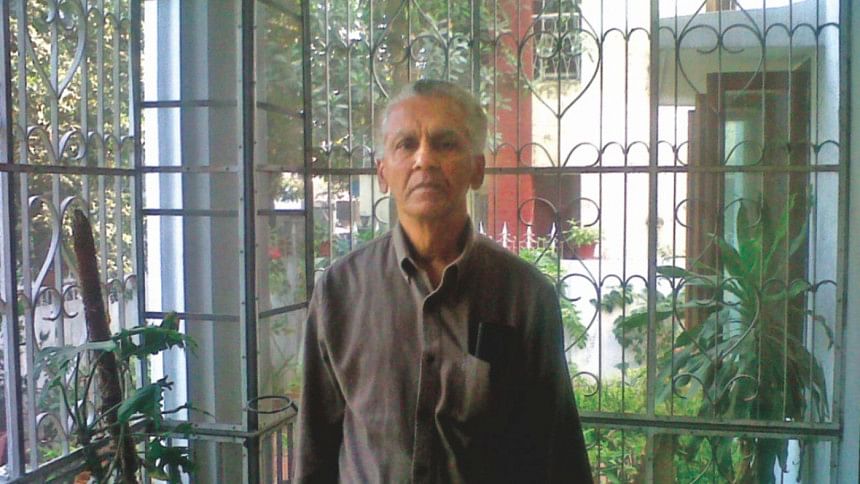What does Shakespeare mean to you?

This year, the 400th anniversary of Shakespeare's death prompted an outpouring of celebrations around the world. People wanted to commemorate the occasion from different angles. They all had something to say about the Bard. Imtiaz Habib, a professor of Early Modern English Literature at Old Dominion University wanted to do something special at his university. He ended up organising a mega event involving the city of Norfolk and the state of Virginia, that featured an international conference, about eight full length productions of Shakespeare's plays, historical and archaeological exhibitions, and a documentary film which he made. He was invited by Independent University, Bangladesh (IUB) to deliver the keynote address on November 3rd to inaugurate an international conference on the occasion.
Dr. Habib is one of the leading scholars in anti-colonial empirical race studies of Shakespeare's England and author of Shakespeare's Pluralistic Concepts of Character: A Study in Dramatic Anamorphism (1993); Shakespeare and Race: Postcolonial Praxis in the Early Modern Period (2000); and Black Lives in the English Archives 1500-1677: Imprints of the Invisible (2008), and numerous scholarly essays on colonialism and race in the early modern period. His works have been featured in the British Library's exhibition on the history of London, and he has been interviewed by numerous media outlet including the BBC in London.
At his house in New DOHS, Mohakhali, Prof Habib talks about why he is so fascinated by
Shakespeare. "Jamestown, the first permanent English settlement in the US, is only 40 miles from my university", he says. When the settlers came, Shakespeare was still alive. They were people from Shakespeare's world. Our way of approaching the event was that Shakespeare's world also had an impact on America."
Dr. Imtiaz says that the days of studying literature for the sake of literature are long gone. Any literary art should be considered in its total social context. "Why should you read Shakespeare unless he speaks directly to you?" And that's exactly what he found in a passage in scene 1 Act 2 in A Midsummer Night's Dream which mentions "a lovely boy stolen from an Indian King."
An incorrigible inquirer, he wanted to dig deeper. Where in India exactly was this boy from? What does Shakespeare mean by "stolen from an Indian King?" The play was published in 1595, Shakespeare's career started in 1591. How did Shakespeare come to know about India? "To find that out we have to look at the otherwise ignored account of the trip of Ralph Fitch, a London leather seller, to India in 1583."
Commissioned by a group of wealthy London merchants, it was a commercial spying mission to explore business opportunities in India, then a Portuguese colony. The trip took eight years to complete and took Fitch across the heart of Mughal India from Goa to Delhi-Agra to Kolkata, Chittagong in the East, then farther down to Myanmar, Indonesia, Sumatra and Borneo. "Upon his return and de-briefing by his sponsors which led to his consultancy in the formation of the East India Company half a decade later, his experiences were recorded by that indefatigable Elizabethan advocate of overseas English expansion Richard Hakluyt and published in short form in his Principal Navigations and Voyages of the English People in 1598, and more fully by William Foster in 1921."
The chain of events takes a rather dramatic turn from here. "Fitch was in India for two years out of which he spent 14 months in parts of Bengal, now Bangladesh. What more did he see here except silk, paper and spices? At that time the Portuguese were abducting a lot of young boys and smuggling them back to their country. Later, the English also did it. It is obvious that Fitch witnessed that but didn't write about it."
What does this have to do with Shakespeare? "I argued that a chance meeting between Shakespeare and Fitch was unavoidable. Travellers like Fitch would come back from their journey and talk about it in pubs, a common meeting place for Londoners. A Midsummer Night's Dream was published in 1595. And Fitch went back to London from India in 1591. A young, aspiring writer like Shakespeare would want to collect interesting materials for his plays and it is likely that he would go to a pub and meet someone like Fitch. Besides, his family having being involved in the leather trade, he knew a lot of people in the leather business. But this cannot be proved although we know it happened. I call it historical dark matter."
The passage was written against this backdrop. "Many plays of Shakespeare mention ships full of merchandise being brought to England. The other side of the story, of course, is loot which the British Empire thrived on. K.N. Chowdhury and other foremost authorities on Indian economic history have shown that the resource taken from Bengal alone was much greater than what was taken from all other British colonies combined."
What's the meaning of all this? "We want to remember Shakespeare. But in what context? This is one context which would make a lot of people very uncomfortable. But every work of art has an awkward underbelly. If we want to value art, we have to consider the whole, not just the part that glitters. The point of saying all this is that we have a part in the cultural capital that is Shakespeare. This is Shakespeare's debt to our country. For Dhaka and Bangladesh this could start a new conversation about Shakespeare."
Shakespeare was a product of his time and during his time, these things happened. "If we study the social factors, we understand history a little better. If we know how something happened, then there's a chance that we can prevent it from happening in future. And this way we can also do the proper justice to his work," Professor Habib concludes.
Shakespeare would have agreed. "No legacy is so rich as honesty."
The writer is a member of the Editorial Team at The Daily Star.

 For all latest news, follow The Daily Star's Google News channel.
For all latest news, follow The Daily Star's Google News channel. 



Comments